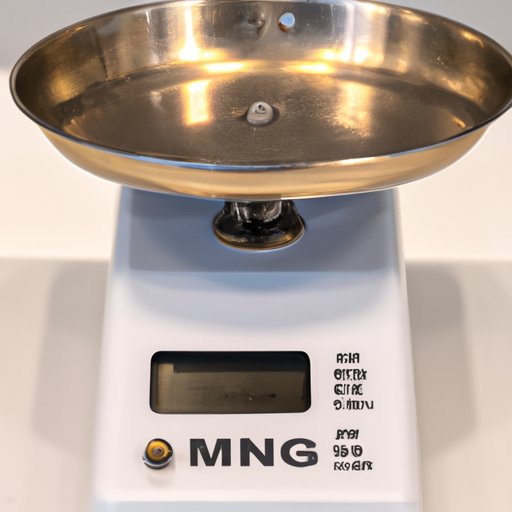I. Introduction
Are you confused about how many milligrams are in a kilogram? Don’t worry, you’re not alone. Understanding the relationship between milligrams and kilograms is essential in many fields such as medicine, cooking, and science. In this article, we will explore the definition of milligrams and kilograms, how to convert between the two, and the importance of accurate measurements in various fields.
II. Understanding the conversion factor
Milligrams and kilograms are two units of measurement that are commonly used in the fields of science, medicine, and cooking.
A milligram is a unit of mass or weight that is equal to one-thousandth (1/1000) of a gram. A kilogram, on the other hand, is a unit of mass that is equal to 1000 grams.
The conversion factor between milligrams and kilograms is 1000000. In other words, there are one million milligrams in a kilogram. This means that if you have a measurement in milligrams, you can convert it to kilograms by dividing the number of milligrams by one million. Similarly, if you have a measurement in kilograms, you can convert it to milligrams by multiplying the number of kilograms by one million.
To help make this concept clearer, let’s look at some example conversions:
- 10,000 milligrams = 0.01 kilograms (divide by one million)
- 500 milligrams = 0.0005 kilograms (divide by one million)
- 2 kilograms = 2,000,000 milligrams (multiply by one million)
- 0.5 kilograms = 500,000 milligrams (multiply by one million)
III. Visualizing the weights of common objects
Now that we understand the conversion between milligrams and kilograms, let’s look at some common objects and their weights in these units to help grasp the difference between the two.
Some objects that weigh around a milligram include grains of salt, a single flower petal, and a hummingbird’s feather. On the other hand, objects that weigh around a kilogram include a liter of water, a laptop computer, and a small dog.
By comparing the weights of these objects, we can visualize the difference between milligrams and kilograms.
IV. Importance of understanding milligrams and kilograms in different fields
The relationship between milligrams and kilograms is essential in many fields, including medicine and cooking. In medicine, accurate measurements of drugs are necessary to ensure the correct dosage is given to a patient. A slight miscalculation of an amount could have serious consequences. Similarly, accurate measurements of ingredients are crucial in cooking to ensure the dish tastes as intended.
Other fields that rely on accurate measurement of milligrams and kilograms include chemistry, physics, environmental science, and microbiology. Inaccurate measurements in these fields could lead to skewed results and incorrect conclusions, which could ultimately harm the progress of scientific research and environmental protection.

V. History of the metric system
The metric system, which is the modern system of measurement used in most countries, was developed in France in the late 18th century. It was introduced as a way to standardize measurements and simplify them for everyday use.
The metric system is based on a set of fundamental units, including the meter (length), kilogram (mass), and second (time). These units are used to derive other units, such as the liter (volume) and the gram (weight).
VI. Tips for converting between milligrams and kilograms
Converting between milligrams and kilograms can be a daunting task for some people, but there are practical steps you can take to make the process easier.
- Write down the conversion factor (1,000,000) so you can refer to it easily
- Use a calculator to avoid errors in calculation
- Round off the answer to the appropriate number of significant figures
It is also essential to avoid common mistakes, such as forgetting to move the decimal point the correct number of places or using the wrong conversion factor. Double-checking your work can help avoid these mistakes and ensure accurate measurements.
VII. Impact of using the wrong unit of measure
Using the wrong unit of measure can have serious consequences, particularly in fields such as medicine and science. An incorrect dosage of a drug could have adverse effects on a patient’s health, while an inaccurate measurement in a scientific experiment could yield incorrect results, leading to incorrect conclusions and wasted resources.
For example, in 1999, the Mars Climate Orbiter was lost due to a simple error in measurement units. The navigation software used English units (pounds and feet) while the actual measurements were in metric units (newtons and meters), causing the spacecraft to approach Mars at the wrong altitude and be destroyed by atmospheric forces.
VIII. Creative illustration of milligrams per kilogram
Understanding the concept of milligrams per kilogram can be challenging, so let’s use a fun, storytelling approach to help readers remember the information presented in the article.
Imagine you have a kilogram of sugar, and you want to distribute it equally among one million ants. You would have to divide the sugar into one million little bits for each ant to have a milligram of sugar. Alternatively, if you have a milligram of sugar and want to distribute it among a thousand ants, each ant would only get a fraction of the milligram because there are one million milligrams in a kilogram.
IX. Conclusion
In conclusion, understanding the relationship between milligrams and kilograms is essential in many fields, including medicine, cooking, and science. Accurate measurements can have far-reaching consequences, from the correct dosage of a drug to the success of a scientific experiment. By following practical tips for conversion and avoiding common mistakes, we can make accurate measurements and avoid errors that could compromise the integrity of our work.
